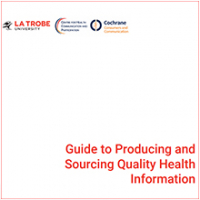
The Research Centre for Health Communication and Participation at La Trobe University has released a new Guide for producing or sourcing quality health information for consumers and carers.
If you're a health professional, health administrator or consumer or carer involved in ensuring health information meets the needs of people who use your services, then this Guide may be useful for you. It covers health information presented in a variety of formats – print, digital, video and audio.
The Guide has four Guidelines:
1. Governance
2. Partnering with consumers
3. Supporting health literacy
4. Sharing resources.
Within the Guide the importance of each Guideline is explained. This is followed with a list of key tasks that contain advice and comprehensive supporting information. Throughout there are links to resources that provide more detail and which aid implementation. You can use this Guide to implement one or more of the Guidelines in any part (or all) of your health service or use it as a review tool to compare your policies and practice against the Guidelines.
Each Guideline is paired with a self-evaluation toolkit which provides practical questions in a workbook format to aid implementation of the Guidelines or to review your achievements. In the Toolkit sections, each Guideline has been mapped against the National Safety and Quality Health Service Standards. The Guide also supports the Effective Communication domain in the new Partnering in Healthcare Framework developed by Safer Care Victoria.
The Guide also includes an appendix with links to resources about interpersonal communication for health professionals.
The Guide was created with support from Safer Care Victoria and La Trobe University, and follows recommendations from the 2014 Victorian Consultation on Health Literacy undertaken by the Centre. It draws on health information research, policy, standards and guidelines from Australia and internationally.
Words: Sophie Hill, Centre for Health Communication and Participation, La Trobe University
